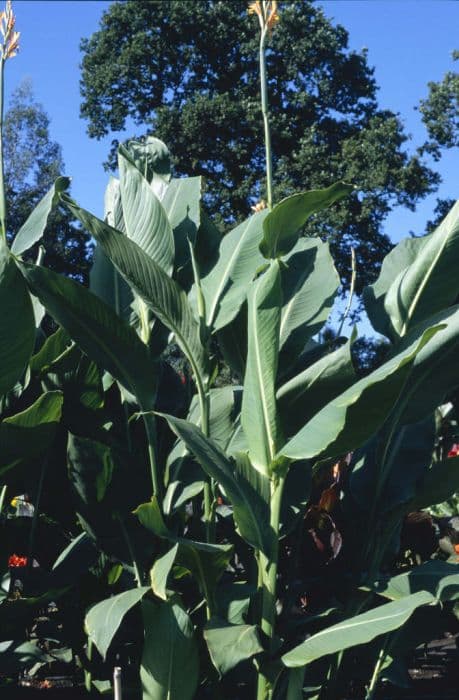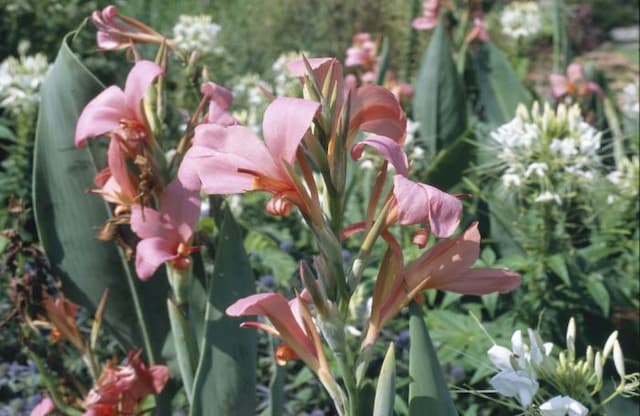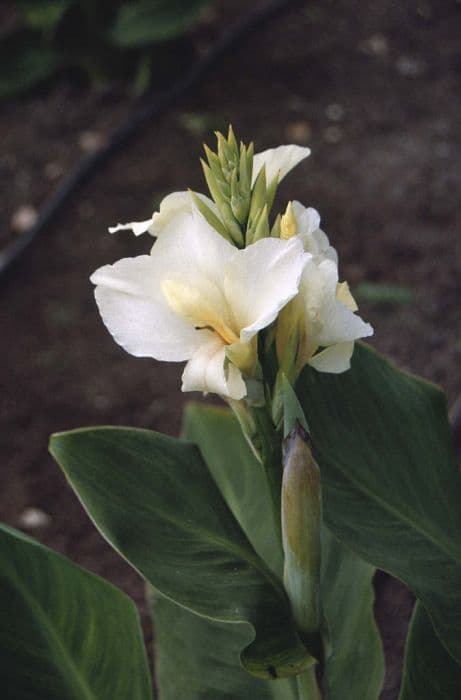Canna Lily Canna 'Aphrodite' van Klaveren

ABOUT
The Canna 'Aphrodite' van Klaveren is a striking ornamental plant primarily revered for its vibrant blooms and lush foliage. The flowers of this plant are particularly eye-catching, often displaying a striking pink hue with a delicate, ruffled appearance. These gorgeous blooms may have a gradient of color, sometimes transitioning to a softer or more intense shade towards the edges or at the center, adding to their exotic charm. The foliage of the Canna 'Aphrodite' provides a lush backdrop for its effervescent flowers. Leaves are typically broad and paddle-shaped, exuding a tropical vibe. The color of the leaves can vary from deep green to burgundy or even bronze-tinged, depending on various factors. The plant's overall appearance radiates a tropical and luxurious feeling, making it a favored choice for gardeners looking to add a splash of color and drama to their landscapes. The striking contrast between the flamboyant blooms and the robust foliage completes the majestic profile of the Canna 'Aphrodite' van Klaveren.
About this plant
 Names
NamesFamily
Cannaceae.
Synonyms
Canna Lily, Canna, Indian Shot.
Common names
Canna 'Aphrodite' van Klaveren.
 Toxicity
ToxicityTo humans
The Canna plant is generally considered non-toxic to humans, and there are no well-documented cases of poisoning from ingesting parts of the Canna 'Aphrodite' variety. However, it is always wise to exercise caution and avoid eating ornamental plants as their safety for consumption has not been thoroughly evaluated. If a person ingests a part of the Canna plant and experiences any adverse effects, it is recommended to seek medical attention.
To pets
Canna plants, including the 'Aphrodite' variety, are not known to be toxic to pets such as dogs and cats. There might be individual cases where a pet could have a mild digestive upset after ingesting parts of a Canna plant, but this is not common. Nevertheless, pet owners should always monitor their pets and prevent them from eating non-food plants, as reactions can vary between different animals. If any concerning symptoms arise after ingestion, consulting a veterinarian is advisable.
 Characteristics
CharacteristicsLife cycle
Perennials
Foliage type
Deciduous
Color of leaves
Green
Flower color
Pink
Height
3-4 feet (0.9-1.2 meters)
Spread
1.5-2 feet (0.5-0.6 meters)
Plant type
Bulb
Hardiness zones
7
Native area
Americas
Benefits
 General Benefits
General Benefits- Ornamental Appeal: Canna 'Aphrodite' provides a striking visual display with its vibrant flowers and large foliage, enhancing the aesthetic of gardens and landscapes.
- Low Maintenance: This plant is relatively easy to care for, requiring minimal attention once established in the right conditions.
- Drought Tolerance: It can withstand dry conditions once established, making it suitable for regions with water scarcity.
- Rapid Growth: The Canna 'Aphrodite' is known for its fast growth rate, filling in garden spaces quickly and providing immediate impact.
- Attracts Pollinators: The flowers are attractive to pollinators such as bees and hummingbirds, supporting local ecosystems.
- Versatility: It can be planted in garden beds, borders, and containers, offering flexibility in landscape design.
- Seasonal Interest: Its blooming season provides a pop of color during the summer months when many other plants have ceased to flower.
- Privacy Screen: Due to its tall growth, it can be used to create natural privacy screens or to hide unsightly areas.
- Soil Improvement: The roots help in breaking up compact soils, improving soil texture and quality over time.
- Erosion Control: The robust root system can help stabilize soil in sloped gardens, preventing erosion.
 Medical Properties
Medical PropertiesThis plant is not used for medical purposes.
 Air-purifying Qualities
Air-purifying QualitiesThis plant is not specifically known for air purifying qualities.
 Other Uses
Other Uses- Canna 'Aphrodite' can be used in biofabrication, such as creating biodegradable pots or packaging materials, due to the fibrous nature of its stalks.
- The starchy rhizomes of the Canna plant can be processed to produce bioplastics, offering an eco-friendly alternative to traditional petroleum-based plastics.
- Artists may use the large Canna leaves as a natural canvas, painting directly onto the surface for a unique botanical art piece.
- The long, sturdy stems of Canna 'Aphrodite' can be used for handcrafting small items like pens or weaving baskets and mats when dried properly.
- Dried Canna leaves are often used in floral arrangements and can be painted or treated to preserve their color and shape for decorative purposes.
- The seeds of Canna species are sometimes used in jewelry making, as they have a hard coat that can be polished and drilled to create beads.
- In the craft of papermaking, the fibrous material from the Canna plant can be incorporated into the paper pulp to add texture and strength to the final product.
- During festive seasons, the plant's large, colorful leaves and flowers can be incorporated into natural garlands and wreaths for decoration.
- As a source of natural dye, the pigments from Canna 'Aphrodite' flowers and leaves can be used to tint fabrics, yarns, or papers.
- Gardeners might use parts of the Canna plant as mulch or compost to enrich the soil, taking advantage of its decomposable organic matter.
Interesting Facts
 Feng Shui
Feng ShuiThe plant Canna is not used in Feng Shui practice.
 Zodiac Sign Compitability
Zodiac Sign CompitabilityThe plant Canna is not used in astrology practice.
 Plant Symbolism
Plant Symbolism- Love: Named after Aphrodite, the Greek goddess of love and beauty, this plant symbolizes romantic love and passion.
- Beauty: The stunning appearance of the flower represents beauty and perfection.
- Fertility: The Canna genus is known for its lush growth, symbolizing fertility and abundance.
- Transformation: Cannas are often associated with change and transformation due to their ability to grow rapidly and their dramatic blooms.
- Fire: The bright reds and oranges of some Canna flowers symbolize the element of fire, representing energy and inspiration.
 Water
WaterCanna lilies, like the Canna 'Aphrodite', should be watered generously to keep the soil steadily moist but not soggy. They typically require watering once a week, but this frequency should increase to two or three times per week during hot, dry periods. The amount of water needed can be around one to two gallons per plant, per watering session, ensuring the water penetrates deeply to encourage strong root growth. When watering, aim at the base of the plant rather than overhead to minimize the risk of fungal diseases. In winter, when the plants are not actively growing, reduce watering significantly to prevent rot.
 Light
LightCanna lilies prefer full sun conditions, thriving in areas that receive at least six hours of direct sunlight a day. For Canna 'Aphrodite', choose a spot in your garden that is bathed in sunlight for most of the day. If grown indoors, place near a south-facing window to ensure ample light. Avoid too much shade, as this will lead to fewer blooms and leggy growth.
 Temperature
TemperatureCanna lilies, including the Canna 'Aphrodite', favor warm temperatures ranging from 60°F to 90°F. They can endure a brief period of cooler temperatures down to about 55°F but should be protected from frost, which can damage or kill the plant. To ensure vigorous growth and flowering, maintain a warm environment, especially during the growing season.
 Pruning
PruningPrune Canna lilies including Canna 'Aphrodite', to remove spent flowers and encourage further blooming. Deadheading can be done throughout the blooming season as flowers fade. After the first frost in fall, cut back the foliage to a few inches above the ground as part of winter preparation. Pruning is also essential for removing damaged or diseased leaves, promoting good air circulation, and maintaining an attractive plant shape.
 Cleaning
CleaningAs needed
 Soil
SoilFor Canna lilies, including the 'Aphrodite', the best soil mix is well-draining, rich in organic matter, and slightly acidic to neutral with a pH of 6.0 to 6.5. A mix of two parts garden soil, one part well-rotted manure or compost, and one part sand or perlite is ideal to ensure proper drainage and fertility.
 Repotting
RepottingCanna lilies should be repotted every 2 to 3 years or when they become root-bound. They are best repotted in spring before the growing season begins. When repotting, divide the rhizomes to promote healthy growth and plant vigor.
 Humidity & Misting
Humidity & MistingCanna lilies thrive in high humidity conditions. They prefer a humidity level of around 60-70%. They are tolerant of lower humidity levels but maintaining higher humidity will help keep the foliage lush and facilitate growth.
 Suitable locations
Suitable locationsIndoor
Provide full sun, keep soil moist and fertilize monthly.
Outdoor
Plant in full sun, rich soil; keep well-watered, mulch roots.
Hardiness zone
7-11 USDA
 Life cycle
Life cycleCanna 'Aphrodite' van Klaveren, commonly known as Canna Lily 'Aphrodite', begins its life cycle when a rhizome is planted in warm, well-drained soil after the last frost. It rapidly develops foliage, with large, banana-like leaves unfurling as it enters the vegetative growth stage. The Canna Lily 'Aphrodite' then progresses to the flowering stage in late spring to early summer, where it produces striking pink blooms atop tall stalks that attract pollinators. After the flowering period, which can last until the first frost, the plant sets seeds in the form of green pods, which later dry and release seeds, although Canna Lilies are more commonly propagated through rhizome division. Once temperatures drop, the Canna Lily 'Aphrodite' enters dormancy; the above-ground foliage dies back, and the rhizomes can be left in the ground or dug up and stored in a cool, dry place over winter. In the following spring, the cycle starts anew as the stored rhizomes are replanted or the surviving rhizomes in the ground resprout, continuing the life cycle of the Canna Lily 'Aphrodite'.
 Propogation
PropogationPropogation time
Spring to Summer
Canna 'Aphrodite' van Klaveren, known commonly as Canna Lily, is typically propagated by dividing its rhizomes. The best time to propagate the plant is in the spring after the last frost when the soil has warmed up, usually when the temperature consistently hits around 60°F (16°C). To propagate by division, carefully dig up the clump of rhizomes and use a sharp knife to cut them into sections, ensuring each section has at least one eye, which is a growth point. Plant these divisions about 3 to 4 inches (7.5 to 10 cm) deep and water them well. Within a few weeks, the new plants should begin to grow, eventually producing foliage and blooms similar to the parent plant.









